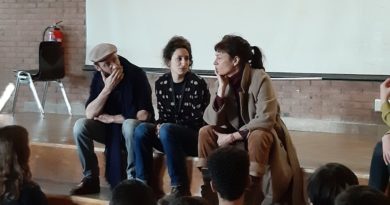Empowering Through Cooperation: Lola Sanjuán’s Path to Entrepreneurial Success
It’s late and somewhat dark outside. Inside, Lola Sanjuán is very busy in her kitchen, answering my questions. She seems a bit tired, but her face lights up when she talks about her work and dreams. She must have done this before because she responds quickly: « Since I was little, I’ve enjoyed working in teams, perhaps that’s why I’m a co-founder of a cooperative company, a small communication and strategy consulting firm that has the power to turn some dreams into reality”.
First of all, tell us a bit about yourself.
I am Lola Sanjuán, expert in getting into puddles, and I like cooking for my daughter Lola. I love travelling and enjoying the Andalusian sun in Spring. I work in a cooperative business.
What do you do in your business?
I am the director of a consulting firm, CKL Comunicaciones Coop. I work in a communication and strategy cooperative dedicated to positioning on the public agenda, products, etc. A cooperative is like a team where everyone is important and works together to achieve something special. In a cooperative, people come together to do business, but instead of having one boss who decides everything, everyone has a voice and can make decisions together. Everyone in the cooperative is an owner and shares responsibilities and rewards. Together, they work to meet the needs and dreams of everyone in the group, whether it’s making money, helping each other, or doing something good for the community.

Why did you choose to be a business woman from the business formula of cooperativism and the social economy?
It seemed to me to be a business model with values, putting people before capital and much more sustainable than other models. To explain social economy, imagine there’s a group of people working together to do business in a different way. Instead of only caring about making money, these people care a lot about helping others and taking care of the planet. They decide together how to make decisions and how to share the money they earn. These businesses and groups are called ‘social economy’. In short, is about being good people and helping others while doing business. I also like sharing the risk with other colleagues when you start, sharing the laughter and joys is important to reach your final goal.
How did you get the idea about this project?
I had worked in institutional communication and discovered that with everything being urgent on a daily basis, people couldn’t pause and take the time to think and plan, but usually there are few people available to do it from within companies and institutions. Based on this idea, I gradually developed the business model.
How much time did it take you to create this?
It took me a year of planning, research, and study. I knew how to be a good professional, but I knew nothing about the business world, I didn’t even know how to make an invoice, or handle taxes… It also took me a lot of time to choose the business model, which eventually turned out to be a cooperative, and of course, to find the team. Colleagues are essential in this type of business.
Have you always had this ‘dream’?
No! I had never considered entrepreneurship or being a business owner before. I had always imagined myself working for others. But after spending five years in jobs that didn’t respect my leisure time or work-life balance, or in tasks that didn’t fulfil me personally, I decided to take a leap of faith and create my own company using a collective entrepreneurship model.

How was the experience of working with family?
Haha! Well, eventually my sisters started working with me. Most of the time, working together is fun. It’s important to separate what is personal or related to family matters from work issues, not to mix them, and being honest is the key to making everything work well.
Do you always get along?
Yes, with work-related issues almost always, and when there are disagreements, there are always more people in the company to turn to and reach an agreement.
What advice would you give to a young woman who wants to be an entrepreneur?
I would tell her that she should always try, that dreams have no limits and that with ideas, you have to take action; it depends on you to take the leap. I would also tell her that it’s important to surround herself with people who believe in her and don’t clip her wings to stop her from fulfilling her dreams—friends, partner, etc.
Would you want your daughter, when she grows up, to do the same thing as you?
I would like her to be happy doing what she loves most and to choose as freely as possible. I also believe that entrepreneurship in the social economy is part of the future, just like strategic thinking and communication, so if she ultimately decides to pursue it, she would always have a point of reference.
In your day-to-day life, where do you get ideas for your company and projects?
From everything I read, see, or hear; Contact with different people seems essential to open the mind to new ideas, to travel and investigate, and of course, to get the inspiration and muses while you´re working.
Do you consider yourself an entrepreneurial person?
Yes, since I was little, although I was somewhat shy, I gained confidence in myself. I discovered that I enjoyed working in teams; I volunteered for almost everything, was class representative, university delegate, etc. At this point, I am also convinced that entrepreneurship can also be fostered from school and that teachers can be a key element in igniting the spark of entrepreneurship at an early age.
Thank you so much for your time, I´ve learned a lot.
Thanks.
Lola García Sanjuán / S4ESA / EEB1 Uccle




